stdClass Object
(
[id] => 16253
[title] => The honour of the rejected
[alias] => the-honour-of-the-rejected
[introtext] => Greater than Guilt/17 - In the end, Saul’s ways are dusty, just like ours
by Luigino Bruni
published in Avvenire on 13/05/2018
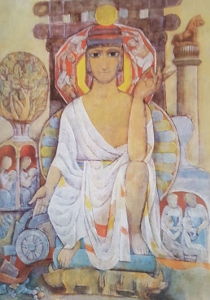 Saul:
Saul:
“Oh my children!...
I was a father. - See thyself alone,
Oh king; of thy so many friends and servants
Not one remains. - Inexorable God,
Is thy retributory wrath appeased?”
Vittorio Alfieri, Saul (English translation by Charles Lloyd)
In every authentic reading, the reader has an active and creative part to play. He is not a spectator of the stories he reads, but a co-screenwriter and actor of them. In the special form of reading we call biblical reading, therefore, the one who reads receives the mysterious but real faculty to transform the characters into people, who, like all living people, grow, change, move and make some unexpected encounters. So it happens that biblical people begin to interact among themselves, to compose relational plots that are different from those thought and desired by their first author. And so the necromancer of En-dor becomes a friend of the father of the prodigal son, Jeremiah discovers himself as David's brother, and Saul becomes Job's travel companion in his misfortune, as he also ends up on the pile of manure, by a God who wants (Saul) or allows for (Job) their misfortune. Struck by divine punishment that’s greater than their (possible) sin, Both Saul and Job are wrapped in the silence of a mute God, who has no words of life for them - perhaps because, quite simply, he is waiting for ours.
[fulltext] => David continues his war alongside the Philistines (1 Samuel 29), but on the eve of the final attack on Saul the leaders don’t let him participate in the battle. In the meantime, the Amalekites - another historical enemy of Israel and Saul, also linked to his repudiation by God (chap. 15) - have seized the city of Ziklag, where David’s family and wives, who had been made prisoners, were also staying. David and his men set out in pursuit of the Amalekites, and thanks to a (providential) meeting with an Egyptian slave, he manages to defeat the enemy army with an ambush: “David recovered all that the Amalekites had taken, and David rescued his two wives” (30:18). He also endeavours in quite some looting: “David also captured all the flocks and herds” (30:20). Not all of David's six hundred men took part in the venture, because two hundred of them were "too exhausted to cross the Besor Valley" (30:10b), and they stopped along the way. When David returned to the camp, “all the wicked and worthless fellows among the men who had gone with David said, »Because they did not go with us, we will not give them any of the spoil that we have recovered«” (30:22). The "wicked and worthless" have never stopped excluding the weaker ones from the distribution of wealth. But we no longer attribute these words and these acts of exclusion to the "wicked and worthless"; instead, we praise them, we clothe them with virtues and fine words such as merit and meritocracy, and then we discard the poor and the “worn out” in their name, after having called them idlers and lazy.
The Bible, on the other hand, follows a different logic: “David said, »You shall not do so, my brothers, with what the Lord has given us. (...) For as his share is who goes down into the battle, so shall his share be who stays by the baggage«” (30:23-24). Wealth is a "gift of the Lord”, and its nature as gift-providence prevails over the reasons for individual merit/demerit (which, however, sometimes exist, even if they are almost always overestimated). So the solidarity that comes from being part of the same community comes before productivity and efficiency, because we are not the real owners of our wealth. Before we could produce it, we receive wealth as a gift. This gives rise to that gratuitousness and gratitude which should accompany our grateful gaze on our riches and on those of others. We have built democracy, rights, pensions, public assistance, universal education, unemployment aids, contributions and the tax system on the idea of wealth-gift, a society where the “exhausted” can legitimately have a share of wealth. These are ancient and great truths that the neo-pelagian ideology of incentive and meritocracy has made us forget in a couple of decades.
But now let us be touched and wounded by the last episode of Saul's life: “And the Philistines overtook Saul and his sons, and the Philistines struck down Jonathan and Abinadab and Malchi-shua, the sons of Saul. The battle pressed hard against Saul, and the archers found him, and he was badly wounded by the archers” (31:2-3). Then Saul said to his armour-bearer, “»Draw your sword, and thrust me through with it, lest these uncircumcised come and thrust me through, and mistreat me.« But his armour-bearer would not, for he feared greatly” (31:4). The scene is narrated without any moral or religious condemnation for Saul. The final editor of the books of Samuel does not read Saul's death as the deserved end for his sins. Instead, what we see is that in accompanying the sad fate of the first king the text tenaciously keeps up a benevolent view. And it gives him a dignified and heroic death: “Therefore Saul took his own sword and fell upon it. And when his armour-bearer saw that Saul was dead, he also fell upon his sword and died with him. Thus Saul died, and his three sons, and his armour-bearer, and all his men, on the same day together” (31:4-6). The story of this tragic fated king ends with a suicide of honour. He did not deserve and he did not have a cowardly death.
The Philistines then cut Saul and his sons’ head off, paraded his armour and sent it around the city to "to carry the good news" to their temples (31:9), and "they fastened his body to the wall of Beth-shan" (31:10). But when the inhabitants of Jabesh-gilead, whose right eye had been poked out by the Ammonites and who had then been saved by Saul (ch. 11), learned of the facts, they “went all night and took the body of Saul and the bodies of his sons... And they took their bones and buried them under the tamarisk tree in Jabesh and fasted seven days” (31:12-13). It’s a fair homage paid to express the people’s gratitude. People remember, their memory is different from the official one of politics and religion. And, only to honour this memory, they are ready to walk all night, recover his body, and assure their defeated friend a worthy burial. Here, under the tamarisk tree, just where Saul used to stay with his spear stuck to the ground, sitting among his standing soldiers. This is a true and profound expression of that law of gratuitousness inscribed in the DNA of the soul of peoples and individuals - no economic law explains why we take trains and planes to go to a friend's funeral, but on the day when the individual cost-benefit calculation prevents us from performing these economically inconvenient acts for the dead, we start gradually forgetting the grammar of economics and reciprocity among the living, too.
David also learns of the deaths of Saul and Jonathan - from an Amalekite coming from the battlefield, who will have a sorry end: “Then David took hold of his clothes and tore them, and so did all the men who were with him. And they mourned and wept and fasted until evening for Saul and for Jonathan his son” (2 Samuel 1:11-12). And it is in David’s act of mourning that we find what for many is his most beautiful song, The Song of the Arc:
“How the mighty have fallen!
Tell it not in Gath,
publish it not in the streets of Ashkelon...
Saul and Jonathan, beloved and lovely!
In life and in death they were not divided;
they were swifter than eagles;
they were stronger than lions.
You daughters of Israel, weep over Saul,
who clothed you luxuriously in scarlet,
who put ornaments of gold on your apparel.
How the mighty have fallen
in the midst of the battle!
“Jonathan lies slain on your high places.
I am distressed for you, my brother Jonathan;
very pleasant have you been to me;
your love to me was extraordinary,
surpassing the love of women.
How the mighty have fallen...” (1:19-27).
There is no need to add comments. Tell it not... In Greek: Euangelizein. Do not bring this bad news, do not proclaim this anti-gospel. Jonathan, "beloved and lovely," and Saul, also, "beloved and lovely," to the very end. If the Bible wanted to preserve this funeral song (taken from very ancient material, from The Book of the Righteous), it is to tell us something about David (who did not rise to the throne by killing his rival). But it also wants to tell us something important about Saul. You don't sing a wonderful song for a bad and evil king. The Bible knew that amidst all the drama Saul preserved his mysterious innocence and purity, earning him this song of David, which is perhaps the most beautiful of all. And if David could sing these words to a repudiated king dominated by a bad spirit who somehow still remained honest, then even the repudiated and the rejected, if they remained sincere in a small corner of their hearts, are worthy of the psalms of David - and ours. The Bible not only reserves blessings for the blessed and the victorious, its most beautiful songs are for Saul's friends, therefore also for us. There are many ways to get into the Bible. Some are reserved for those who seem to be righteous and blessed, but they are very few. The ways of Saul are different and more numerous, these are popular roads, dusty, winding, dark, but where we can all walk.
David had begun his relationship with Saul by playing the lyre for him and singing psalms to chase his "bad spirit” away, because Saul found peace listening to David’s voice and chords. In the end we find another one of David’s songs - the text says that David "sang" this lament. The entire story of David and Saul is positioned between two songs, therefore in a song that has never stopped. The story of Saul does not end with the sword that pierced him through or with his worthy burial under the tamarisk tree. It ends with the song of David, which is a song of resurrection. Every time we start to sing it, Saul, thanks to us, too, becomes a tall and beautiful young man again, we see him looking for his lost donkeys, being in a mystical ecstasy among the prophets, still docile under the consecrating hand of Samuel. For the Bible to continue to live and to rise again, the marvellous song of David is not enough: our song is also needed. All the protagonists of the Bible are “characters in search of an author”, and of a reader who allows them to live again, freeing them from the narrow interpretation of the script that official religions have assigned them. Of a reader shouting: "Come out", and bringing them out alive from their tombs.
download article in pdf
[checked_out] => 0
[checked_out_time] => 0000-00-00 00:00:00
[catid] => 847
[created] => 2018-05-12 19:25:00
[created_by] => 64
[created_by_alias] => Luigino Bruni
[state] => 1
[modified] => 2020-08-23 18:41:25
[modified_by] => 609
[modified_by_name] => Super User
[publish_up] => 2018-05-24 09:25:00
[publish_down] => 0000-00-00 00:00:00
[images] => {"image_intro":"","float_intro":"","image_intro_alt":"","image_intro_caption":"","image_fulltext":"","float_fulltext":"","image_fulltext_alt":"","image_fulltext_caption":""}
[urls] => {"urla":false,"urlatext":"","targeta":"","urlb":false,"urlbtext":"","targetb":"","urlc":false,"urlctext":"","targetc":""}
[attribs] => {"article_layout":"","show_title":"","link_titles":"","show_tags":"","show_intro":"","info_block_position":"","info_block_show_title":"","show_category":"","link_category":"","show_parent_category":"","link_parent_category":"","show_associations":"","show_author":"","link_author":"","show_create_date":"","show_modify_date":"","show_publish_date":"","show_item_navigation":"","show_icons":"","show_print_icon":"","show_email_icon":"","show_vote":"","show_hits":"","show_noauth":"","urls_position":"","alternative_readmore":"","article_page_title":"","show_publishing_options":"","show_article_options":"","show_urls_images_backend":"","show_urls_images_frontend":""}
[metadata] => {"robots":"","author":"","rights":"","xreference":""}
[metakey] =>
[metadesc] => With the death of Saul his cycle closes, but the last word on Saul is David’s song, the most beautiful funeral song of the Bible, which invites us to sing our psalms to revive the characters/people of the Bible, waiting for us.
[access] => 1
[hits] => 2010
[xreference] =>
[featured] => 0
[language] => en-GB
[on_img_default] =>
[readmore] => 9712
[ordering] => 113
[category_title] => EN - Greater Than Guilt
[category_route] => commenti-biblici/serie-bibliche/piu-grandi-della-colpa
[category_access] => 1
[category_alias] => en-greater-than-guilt
[published] => 1
[parents_published] => 1
[lft] => 129
[author] => Luigino Bruni
[author_email] => ferrucci.anto@gmail.com
[parent_title] => IT - Serie bibliche
[parent_id] => 773
[parent_route] => commenti-biblici/serie-bibliche
[parent_alias] => serie-bibliche
[rating] => 0
[rating_count] => 0
[alternative_readmore] =>
[layout] =>
[params] => Joomla\Registry\Registry Object
(
[data:protected] => stdClass Object
(
[article_layout] => _:default
[show_title] => 1
[link_titles] => 1
[show_intro] => 1
[info_block_position] => 0
[info_block_show_title] => 1
[show_category] => 1
[link_category] => 1
[show_parent_category] => 1
[link_parent_category] => 1
[show_associations] => 0
[flags] => 1
[show_author] => 0
[link_author] => 0
[show_create_date] => 1
[show_modify_date] => 0
[show_publish_date] => 1
[show_item_navigation] => 1
[show_vote] => 0
[show_readmore] => 0
[show_readmore_title] => 0
[readmore_limit] => 100
[show_tags] => 1
[show_icons] => 1
[show_print_icon] => 1
[show_email_icon] => 1
[show_hits] => 0
[record_hits] => 1
[show_noauth] => 0
[urls_position] => 1
[captcha] =>
[show_publishing_options] => 1
[show_article_options] => 1
[save_history] => 1
[history_limit] => 10
[show_urls_images_frontend] => 0
[show_urls_images_backend] => 1
[targeta] => 0
[targetb] => 0
[targetc] => 0
[float_intro] => left
[float_fulltext] => left
[category_layout] => _:blog
[show_category_heading_title_text] => 0
[show_category_title] => 0
[show_description] => 0
[show_description_image] => 0
[maxLevel] => 0
[show_empty_categories] => 0
[show_no_articles] => 1
[show_subcat_desc] => 0
[show_cat_num_articles] => 0
[show_cat_tags] => 1
[show_base_description] => 1
[maxLevelcat] => -1
[show_empty_categories_cat] => 0
[show_subcat_desc_cat] => 0
[show_cat_num_articles_cat] => 0
[num_leading_articles] => 0
[num_intro_articles] => 14
[num_columns] => 2
[num_links] => 0
[multi_column_order] => 1
[show_subcategory_content] => -1
[show_pagination_limit] => 1
[filter_field] => hide
[show_headings] => 1
[list_show_date] => 0
[date_format] =>
[list_show_hits] => 1
[list_show_author] => 1
[list_show_votes] => 0
[list_show_ratings] => 0
[orderby_pri] => none
[orderby_sec] => rdate
[order_date] => published
[show_pagination] => 2
[show_pagination_results] => 1
[show_featured] => show
[show_feed_link] => 1
[feed_summary] => 0
[feed_show_readmore] => 0
[sef_advanced] => 1
[sef_ids] => 1
[custom_fields_enable] => 1
[show_page_heading] => 0
[layout_type] => blog
[menu_text] => 1
[menu_show] => 1
[secure] => 0
[helixultimatemenulayout] => {"width":600,"menualign":"right","megamenu":0,"showtitle":1,"faicon":"","customclass":"","dropdown":"right","badge":"","badge_position":"","badge_bg_color":"","badge_text_color":"","layout":[]}
[helixultimate_enable_page_title] => 1
[helixultimate_page_title_alt] => Più grandi della colpa
[helixultimate_page_subtitle] => Commenti Biblici
[helixultimate_page_title_heading] => h2
[page_title] => Greater Than Guilt
[page_description] =>
[page_rights] =>
[robots] =>
[access-view] => 1
)
[initialized:protected] => 1
[separator] => .
)
[displayDate] => 2018-05-12 19:25:00
[tags] => Joomla\CMS\Helper\TagsHelper Object
(
[tagsChanged:protected] =>
[replaceTags:protected] =>
[typeAlias] =>
[itemTags] => Array
(
[0] => stdClass Object
(
[tag_id] => 18
[id] => 18
[parent_id] => 1
[lft] => 33
[rgt] => 34
[level] => 1
[path] => luigino-bruni
[title] => Luigino Bruni
[alias] => luigino-bruni
[note] =>
[description] =>
[published] => 1
[checked_out] => 0
[checked_out_time] => 0000-00-00 00:00:00
[access] => 1
[params] => {"tag_layout":"","tag_link_class":"label label-info"}
[metadesc] =>
[metakey] =>
[metadata] => {"author":"","robots":""}
[created_user_id] => 611
[created_time] => 2015-11-14 21:22:09
[created_by_alias] =>
[modified_user_id] => 609
[modified_time] => 2020-08-01 10:35:46
[images] => {"image_intro":"","float_intro":"","image_intro_alt":"","image_intro_caption":"","image_fulltext":"","float_fulltext":"","image_fulltext_alt":"","image_fulltext_caption":""}
[urls] => {}
[hits] => 128199
[language] => *
[version] => 1
[publish_up] => 2015-11-14 20:22:09
[publish_down] => 2015-11-14 20:22:09
)
[1] => stdClass Object
(
[tag_id] => 37
[id] => 37
[parent_id] => 1
[lft] => 71
[rgt] => 72
[level] => 1
[path] => piu-grandi-della-colpa
[title] => Più grandi della colpa
[alias] => piu-grandi-della-colpa
[note] =>
[description] =>
[published] => 1
[checked_out] => 0
[checked_out_time] => 0000-00-00 00:00:00
[access] => 1
[params] => {}
[metadesc] =>
[metakey] =>
[metadata] => {}
[created_user_id] => 609
[created_time] => 2018-03-31 15:07:53
[created_by_alias] =>
[modified_user_id] => 0
[modified_time] => 2020-08-10 04:38:16
[images] => {}
[urls] => {}
[hits] => 8032
[language] => *
[version] => 1
[publish_up] => 2018-03-31 15:07:53
[publish_down] => 2018-03-31 15:07:53
)
)
)
[slug] => 16253:the-honour-of-the-rejected
[parent_slug] => 773:serie-bibliche
[catslug] => 847:en-greater-than-guilt
[event] => stdClass Object
(
[afterDisplayTitle] =>
[beforeDisplayContent] =>
[afterDisplayContent] =>
)
[text] => Greater than Guilt/17 - In the end, Saul’s ways are dusty, just like ours
by Luigino Bruni
published in Avvenire on 13/05/2018
 Saul:
Saul:
“Oh my children!...
I was a father. - See thyself alone,
Oh king; of thy so many friends and servants
Not one remains. - Inexorable God,
Is thy retributory wrath appeased?”
Vittorio Alfieri, Saul (English translation by Charles Lloyd)
In every authentic reading, the reader has an active and creative part to play. He is not a spectator of the stories he reads, but a co-screenwriter and actor of them. In the special form of reading we call biblical reading, therefore, the one who reads receives the mysterious but real faculty to transform the characters into people, who, like all living people, grow, change, move and make some unexpected encounters. So it happens that biblical people begin to interact among themselves, to compose relational plots that are different from those thought and desired by their first author. And so the necromancer of En-dor becomes a friend of the father of the prodigal son, Jeremiah discovers himself as David's brother, and Saul becomes Job's travel companion in his misfortune, as he also ends up on the pile of manure, by a God who wants (Saul) or allows for (Job) their misfortune. Struck by divine punishment that’s greater than their (possible) sin, Both Saul and Job are wrapped in the silence of a mute God, who has no words of life for them - perhaps because, quite simply, he is waiting for ours.
[jcfields] => Array
(
)
[type] => intro
[oddeven] => item-odd
)







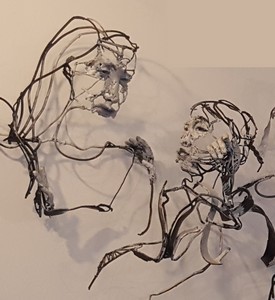 “The Baal Shem said to one of his disciples: »The lowest of the low you can think of, is dearer to me than your only son is to you.«”
“The Baal Shem said to one of his disciples: »The lowest of the low you can think of, is dearer to me than your only son is to you.«”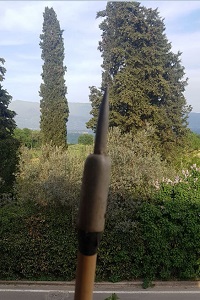 “God is, in a sense, the other, par excellence, the other as other, the absolutely other - and nonetheless my standing with this God depends only on myself. The instrument of forgiveness is in my hands. On the other hand, my neighbor, my brother, infinitely less other than the absolutely other, is in a certain way more other than God: to obtain his forgiveness ... I must succeed in appeasing him. What if he refuses? As soon as two are involved, everything is in danger. The other can refuse forgiveness and leave me forever unpardoned."
“God is, in a sense, the other, par excellence, the other as other, the absolutely other - and nonetheless my standing with this God depends only on myself. The instrument of forgiveness is in my hands. On the other hand, my neighbor, my brother, infinitely less other than the absolutely other, is in a certain way more other than God: to obtain his forgiveness ... I must succeed in appeasing him. What if he refuses? As soon as two are involved, everything is in danger. The other can refuse forgiveness and leave me forever unpardoned."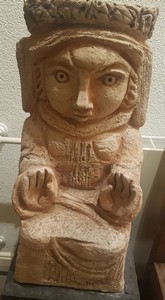 “Goods are now to be seen as the medium, less objects of desire than threads of a veil that disguises the social relations under it. Attention is directed to the flow of exchanges the goods only marking out the pattern.”
“Goods are now to be seen as the medium, less objects of desire than threads of a veil that disguises the social relations under it. Attention is directed to the flow of exchanges the goods only marking out the pattern.” «Caro male,
«Caro male,  “Even as a boy I sometimes looked up with endless sympathy and respect into a half-withered female face on which it was written, as it were: life and reality have given me a drubbing. (...) And if we live, there’s something wondrous about it. Call it God or human nature or what you will, but there’s a certain something that I can’t define in a system, even though it’s very much alive and real, and you see, for me it’s God or just as good as God.”
“Even as a boy I sometimes looked up with endless sympathy and respect into a half-withered female face on which it was written, as it were: life and reality have given me a drubbing. (...) And if we live, there’s something wondrous about it. Call it God or human nature or what you will, but there’s a certain something that I can’t define in a system, even though it’s very much alive and real, and you see, for me it’s God or just as good as God.” “Peter..., do you love [agape] me...?” - “Yes, Lord; ... I love [philia] you.”
“Peter..., do you love [agape] me...?” - “Yes, Lord; ... I love [philia] you.”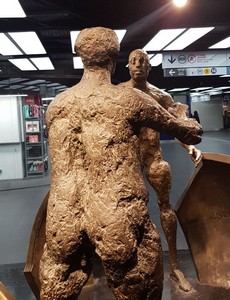 increasingly persecuted by his evil spirits. David returns home after defeating Goliath, and the women of the city go to great him, singing and dancing to the sound of their drums: “Saul has struck down his thousands, / and David his ten thousands” (18:7). Women, another element that will be a constant in David's life, make their solemn entrance dancing, in a row, one after the other, with the typical prettiness and grace of their body movements. They celebrate David's victory, but above all YHWH's victory. Like Miriam, Moses' sister, who sang playing the tambourine for the women's dance after crossing the sea. Saul said: “»They have ascribed to David ten thousands, and to me they have ascribed thousands, and what more can he have but the kingdom?« And Saul eyed David from that day on” (18:8-9). And then, under the action of his evil spirit, he throws the spear at David: “»I will pin David to the wall.« But David evaded him twice” (18:11).
increasingly persecuted by his evil spirits. David returns home after defeating Goliath, and the women of the city go to great him, singing and dancing to the sound of their drums: “Saul has struck down his thousands, / and David his ten thousands” (18:7). Women, another element that will be a constant in David's life, make their solemn entrance dancing, in a row, one after the other, with the typical prettiness and grace of their body movements. They celebrate David's victory, but above all YHWH's victory. Like Miriam, Moses' sister, who sang playing the tambourine for the women's dance after crossing the sea. Saul said: “»They have ascribed to David ten thousands, and to me they have ascribed thousands, and what more can he have but the kingdom?« And Saul eyed David from that day on” (18:8-9). And then, under the action of his evil spirit, he throws the spear at David: “»I will pin David to the wall.« But David evaded him twice” (18:11).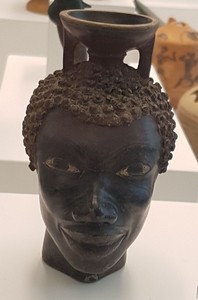 «…they shall beat their swords into plowshares, and their spears into pruning hooks;
«…they shall beat their swords into plowshares, and their spears into pruning hooks; 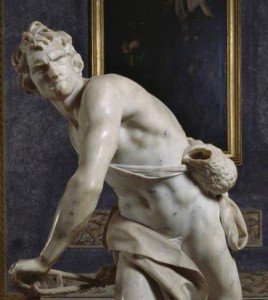 Rabbi Bunam once prayed in an inn. Later he said to his disciples, ‘Sometimes you think you can't pray in one place and you look for another. But this is not the righteous way. For the abandoned place will complain to him: »Why did you not want to pray on me? If there was anything that disturbed you, it was a sign that you had the obligation to redeem me«.’
Rabbi Bunam once prayed in an inn. Later he said to his disciples, ‘Sometimes you think you can't pray in one place and you look for another. But this is not the righteous way. For the abandoned place will complain to him: »Why did you not want to pray on me? If there was anything that disturbed you, it was a sign that you had the obligation to redeem me«.’ 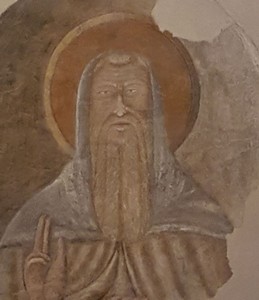 It is very difficult to find only one person in the whole Bible, whether righteous or not, who has not been let down by God, except perhaps Abraham and Jesus. But it is precisely from these denials that the man of faith learns to doubt every institution that he does not let itself be contradicted.
It is very difficult to find only one person in the whole Bible, whether righteous or not, who has not been let down by God, except perhaps Abraham and Jesus. But it is precisely from these denials that the man of faith learns to doubt every institution that he does not let itself be contradicted.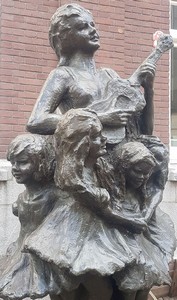 “I shall try to help You, God, to stop my strength ebbing away... But one thing is becoming increasingly clear to me: that You cannot help us, that we must help You to help ourselves. ... I can already forgive God for allowing things to be as they probably must be. To have enough love in oneself to be able to forgive God!”
“I shall try to help You, God, to stop my strength ebbing away... But one thing is becoming increasingly clear to me: that You cannot help us, that we must help You to help ourselves. ... I can already forgive God for allowing things to be as they probably must be. To have enough love in oneself to be able to forgive God!”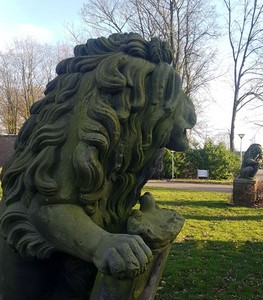 “ your sons and your daughters will prophesy,
“ your sons and your daughters will prophesy, 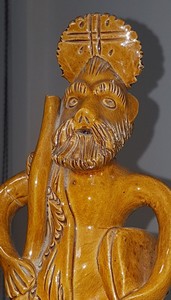 «Vorrei passare come una tela
«Vorrei passare come una tela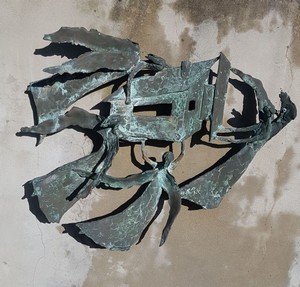 “The most beautiful poems
“The most beautiful poems 